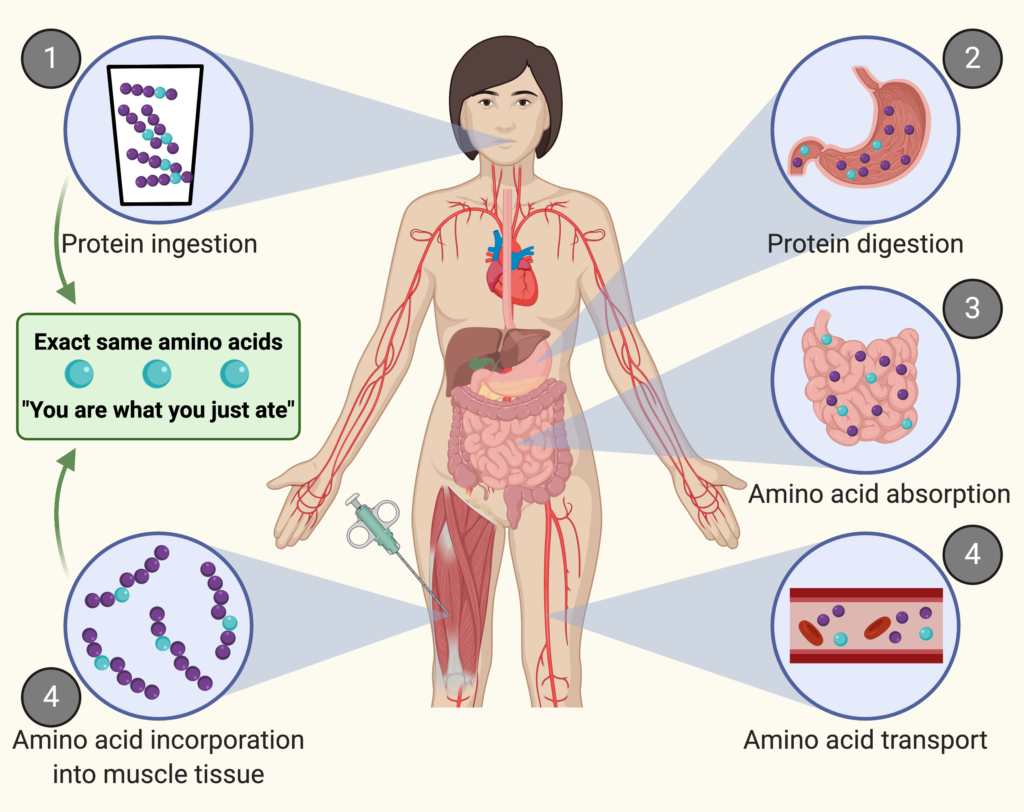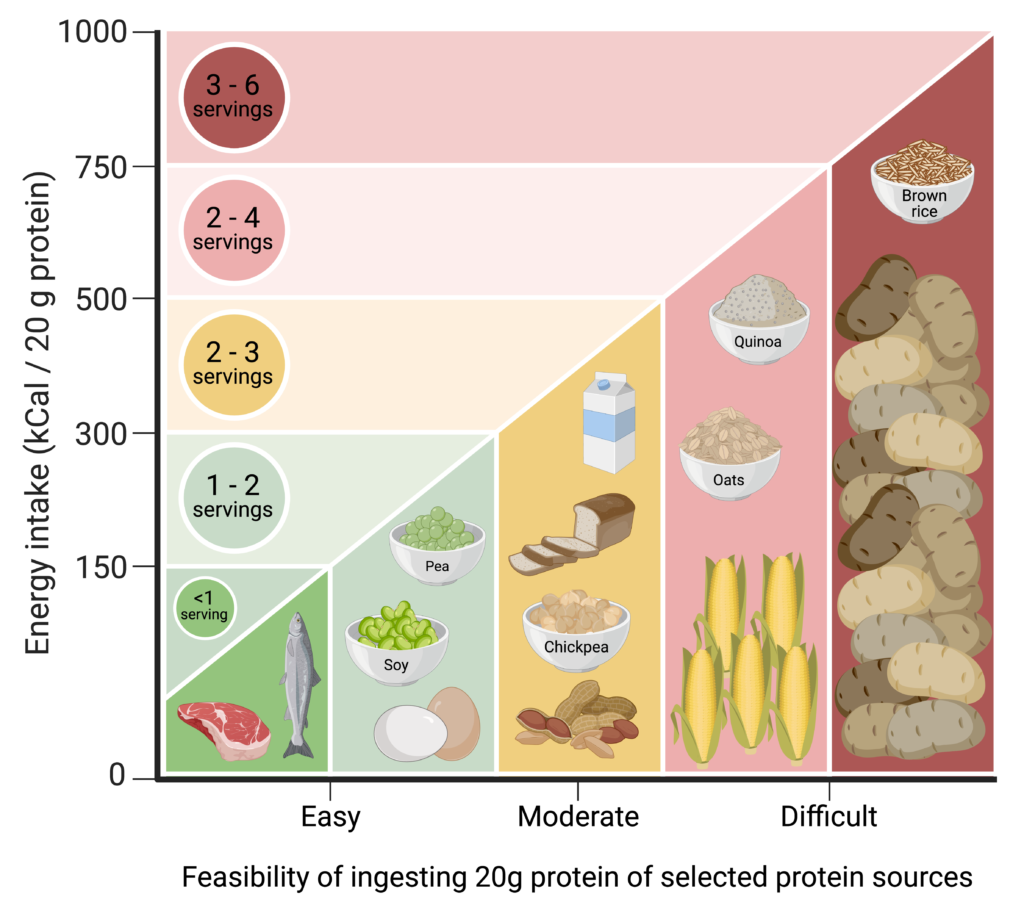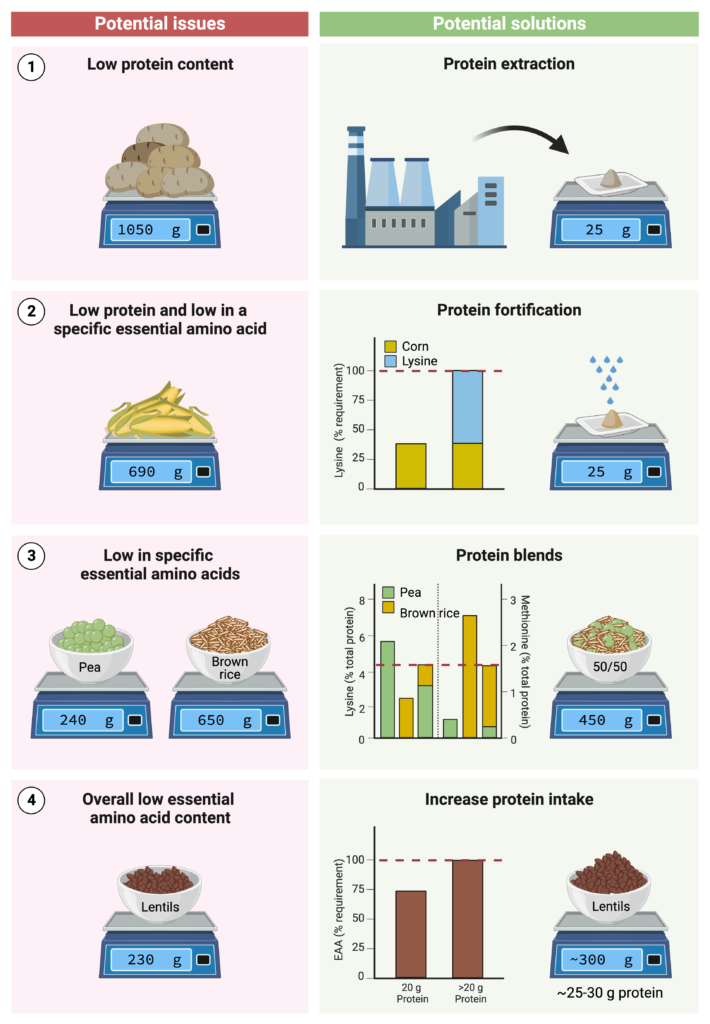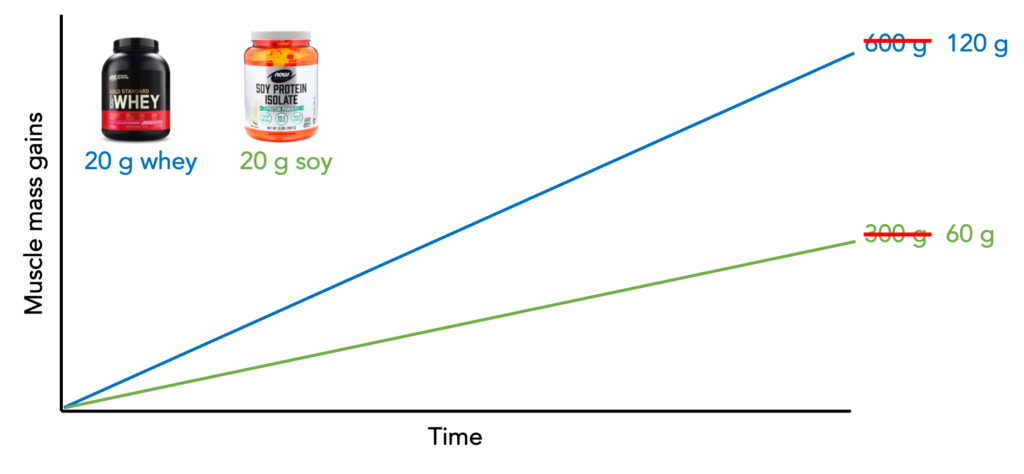Protein is essential to build muscle.
But does the type of protein matter?
Typically, bodybuilders eat a lot of meat. But more recently, plant-based diets have been getting a lot of attention.
A plant-based diet may have benefits with respect to ethical, sustainability, and general health issues.
But now you even start to hear claims that plant protein is just as good, or even better, than animal protein for athletes.
So in this article, we’re going to discuss:
- why you need protein for muscle growth
- why plant protein CAN be less effective
- why you can still maximize gains on a plant-based diet
Contents
1. Why we need protein
We recently published a scientific review article that discussed the potential of plant protein to stimulate muscle growth (Pinckaers, 2021).
So let’s first quickly cover the basics.
Why do we need protein in the first place? After you ingest protein, it is digested in smaller building blocks called amino acids.
The amino acids then get absorbed from the gut into the bloodstream.
From the circulation, these amino acids are taken up by tissues such as muscle.
And finally, the amino acids are then incorporated into protein.
In muscle, this process is called muscle protein synthesis.
So, if you don’t eat protein, your tissues have no building blocks for growth.
You can’t build muscle out of thin air.
A lot of research has shown that the ingestion of protein stimulates muscle protein synthesis (Trommelen, 2019) and in the long-term improves muscle mass gains (Cermak, 2011).
Therefore, most athletes consume a high-protein diet (Gillen, 2017).
So clearly, the amount of protein is important.
But what about protein quality?
Are all types of protein equally effective?
For example, how does plant protein compare to animal protein?
2. Plant protein has a lower quality?
Several studies suggest that plant protein is less potent at stimulating muscle protein synthesis when compared to animal protein (e.g. 1, 2, 3).
In line, some studies suggest that plant protein supplementation results in lower muscle mass gains when compared to animal protein (4, 5)
However, it’s important to note that most studies observed no significant differences between plant and animal protein.
But we’ll get back to that later on…
For now, it’s important to realize there are:
- some studies suggest that plant-based protein has a lower quality
- more studies suggest no difference between plant and animal protein
- no studies suggest plant-protein has a higher quality
So together, this is a somewhat unfavorable picture for plant protein.
However, this does not mean that a plant-based diet has to limit your gains.
Because if we understand why plant protein sometimes appears to have a lower quality…then maybe we can fix them.
2.1 – Lower essential amino acid content
There are various factors that can explain the lower quality of plant protein.
The first is a lower essential amino acid content.
Dietary protein is made up of about 20 common amino acids.
Several of these are classified as essential amino acids.
Essential amino acids cannot be made in sufficient quantity by the body, and therefore it is essential that you consume them in your diet.
Per gram of protein, animal proteins usually have more essential amino acids when compared to plant proteins.
2.2 – Limiting amino acids
But it’s not just the total amount of essential amino acids that matters.
It’s also the composition of essential amino acids.
Imagine building a house.
You can’t build a functional house if you have tons of bricks and windows but NO doors.
It’s the same with building muscle protein.
You need all the individual essential amino acids.
So if a protein source lacks 1 of the EAA, you miss an ingredient for protein synthesis.
And many plant proteins are deficient in one or more essential amino acids.
For example, many plant proteins are deficient in lysine or methionine.
So both the total amount of essential amino acids and the essential amino acid profile are important factors for protein quality.
But there is another issue.
2.3 – lower digestibility
If protein is not properly digested, the amino acids will never reach the muscle.
And plant protein typically has a lower digestibility than animal-based protein.
This is because plant products often have anti-nutrients.
So, plant protein has multiple characteristics that make its quality inferior to animal protein.
So let’s discuss some potential solutions.
3 – Potential solutions to compensate
3.1 – Eat more
The first solution is straightforward: eat more plant protein.
Ultimately, the goal of eating protein is to provide your tissues with enough of all the amino acids.
So, you can compensate for the lower digestibility and the suboptimal amino acid profile by simply eating more.
However, eating more may not always be practical.
On average, protein density is much lower in plant protein compared to animal protein.
Getting 20 g of protein from a steak is easy. But good luck getting 20 g of protein from potatoes.
And it would also bring along a lot of additional calories.
And indeed, vegetarians and especially vegans, have a lower protein intake than meat eaters (Davey, 2003).
Of course, there are plant products with high protein density.
But simply switching to a plant-based diet will likely lower protein intake if you don’t make a conscious effort to have a high protein intake.
So simply eating more food does not seem an efficient solution.
3.2 – Protein extraction
However, protein extraction may be helpful to get more protein in.
Protein supplements are an easy way to get in extra protein, without additional calories from carbohydrates, or without filling you up as much as whole-foods.
In addition, protein supplements are highly digestible, solving another issue.
So adding a protein supplement to your diet can be a huge help.
3.3 – Protein fortification
Another strategy is to fortify foods that are low in one or two essential amino acids.
For example, there are a lot of plant-based meat replacements.
Some of these products are now getting enriched with lysine and/or methionine, because those are often lacking.
Just that small addition can help improve the overall protein quality.
3.4 – Protein blends
And another option to solve the issue of an essential amino acid lacking is by strategically mixing two or more plant proteins.
If one protein is low in lysine and high in methionine, it’s the perfect partner for a protein that is high in lysine and low in methione.
4. Why do many studies find no difference?
Ok, now we have a good understanding of potential issues of plant protein, and how to solve those issues.
Now, lets get back to what I said earlier.
I’ve mentioned there are many studies that show no difference in muscle mass gains when animal and plant protein is supplemented.
In these studies, subjects typically perform exercise approximately 3 times a week for a couple of weeks.
After each training session, they receive either a plant or animal protein shake.
But is it really surprising that many of these studies observe no effect?
Not really.
Imagine that of a 20 g whey protein shake, all 20 g gets built into muscle.
It definitely would not, but we’ll just use it as an example.
Of the 20 g soy protein shake, only 10 g gets built into muscle.
That would mean animal protein is twice as effective. That’s a huge difference!!!
With 3 training session a week, the whey protein would result in 60 g of muscle mass, and the soy in 30 g.
During a 10 week study, that would equal 600 vs 300 g muscle mass gain.
I would say that 300 g is a meaningful difference.
But in research, you have to be conservative with potential conclusions.
The first issue is the measurement equipment.
Even the best measurement equipment is not perfect and introduces variation.
So then you don’t know if the difference is real or simply measurement variation.
And then you also have to stick to specific statistical rules.
So often, the data observes a slightly higher gain in one group when compared to the other.
But then the statistics are not significant, which basically means you are not sure enough that the difference is real and not a coincidence (simplified explanation, for more details see 6).
And that was based on 100% of the whey protein going to muscle mass.
But in reality, our research has shown you should be very happy if 20% of the ingested protein ends up in your muscle.
So the difference would be more like 120 vs 60 g.
So even if animal protein is twice as effective….
…it would still be extremely difficult to show it in relatively short studies comparing a few animal vs protein shakes per week.
5. Full vegan diet
To really figure out a difference between plant vs animal protein, you can compare an entire vegan diet to an omnivorous or even a carnivore diet where the difference occurs at every meal.
And fortunately, this has recently been investigated (Hevia-Larrain, 2021).
One group of subjects were omnivorous and the other group were vegans.
They performed a resistance training program for 12 weeks.
And both groups gained the same amount of muscle.
So even when the whole diet was plant-based, it did not reduce muscle mass gains.
But there are a few things to take into consideration.
The protein intake was high: 1.6 g/kg/d.
As we discussed, as long as you consume enough protein, protein quality is not that big of a concern.
But habitual intake was only 0.9 and 1.2 g/kg/d for the vegan and omnivorous group.
So a habitual diet may not be enough.
In this study the subjects had to use highly-digestible supplement to reach their target intake.
So this study shows that even an entirely plant-based diet can gain the same as an omnivorous diet.
But it does not mean this is always the case.
For example, be careful with lower protein intakes or when the entire diet is from lower digestible whole-foods.
6. Conclusions
I often see US vs THEM mentality in these type discussions.
For example, some omnivores seem to want the plant-based protein to be bad.
But remember that omnivores also eat quite a lot of plant protein – around 40% (Gillen, 2017).
So it doesn’t make much sense to want plant protein to be of lower quality, that means you’re worse off yourself.
So to summarize:
- plant-based protein has various characteristics that lower its quality
- lower EAA content
- unbalanced EAA profile
- lower digestibility
- some studies suggest that plant protein seems to result in lower muscle mass gains
- there are various solutions to solve these issues, such as eating more protein to compensate and using highly digestible protein supplements
- with a bit of effort, it is possible to maximize the gains with a plant-based diet
Our scientific review publication:
Pinckaers et al. The Anabolic Response to Plant-Based Protein Ingestion. Sports Med, 2021





Good to address the biases that exist around this subject. Both the pro-meat and the pro-vegan groups tend to exaggerate.
Agree